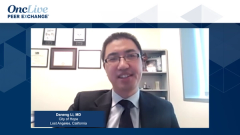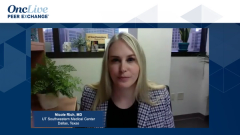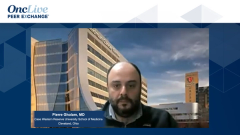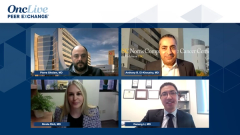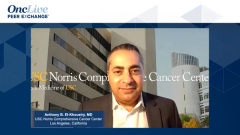
Phase 3 COSMIC-312 Study in Advanced HCC
Daneng Li, MD, evaluates the use of cabozantinib plus atezolizumab in first-line advanced unresectable HCC as seen in the COSMIC-312 study.
Episodes in this series

Anthony B. El-Khoueiry, MD: Recently, there have been a couple of developments, with new data coming out from the COSMIC-312 and HIMALAYA studies. I’m going to ask my colleague Dr Li to briefly review those studies.
Daneng Li, MD: Thanks so much, Dr El-Khoueiry. As you mentioned, we’ve had a lot of activity and continue to have a lot of activity for our patients with unresectable HCC [hepatocellular carcinoma]. The COSMIC-312 study was a large global phase 3 study. It included about 840 patients worldwide. These were targeting the same population that you highlighted in the IMbrave150 study. This was a first-line study for patients with advanced unresectable HCC. Patients were randomized 2:1:1 to receive cabozantinib at 40 mg—a lower dose of cabozantinib—plus atezolizumab vs sorafenib, which is our prior standard for advanced unresectable HCC. They also had an exploratory arm of frontline full-dose cabozantinib at 60 mg vs sorafenib as well. It had dual primary end points of progression-free survival [PFS] as well as overall survival [OS].
In terms of progression-free survival, the combination of 40-mg cabozantinib plus atezolizumab every 3 weeks led to improvement in progression-free survival from 4.2 months up to 6.8 months vs sorafenib. That’s very consistent with what we saw with the combination of atezolizumab plus bevacizumab in the IMbrave150 study. But what was surprising was that when they analyzed the data at interim analysis for overall survival, there was no statistical difference in terms of overall survival with cabozantinib at 40 mg plus atezolizumab vs sorafenib. The overall survival was 15.5 months for sorafenib and 15.4 months for the combination of cabozantinib plus atezolizumab. It appears that there’s improvement in tumor control with the frontline regimen compared with sorafenib, but that didn’t necessarily translate into an overall survival benefit.
Anthony B. El-Khoueiry, MD: As you know, we’re still awaiting the mature overall survival data for that study, so this was interim survival. Longer follow-up is needed, but I agree. The discrepancy between PFS and OS is something to watch out for. I’d add that the response rate for the cabozantinib-atezolizumab combination was at 11%. That’s a bit lower than expected as well, but a very high disease control rate in the 80% range.
Daneng Li, MD: Yes. This is maybe what we expected from cabozantinib. We’ll have to see the more mature data in terms of how many of these patients potentially had significant dose reductions. It was already starting at a lower dose of cabozantinib, 40 mg, based on initial phase 1 studies from the COSMIC-021 study. We’ll have to see how many of those patients required further dose reductions in that arm.
Anthony B. El-Khoueiry, MD: For fairness, the study was designed statistically to be positive when either end point was met. PFS and OS were coprimary end points, so the fact that PFS met its end point by definition statistically makes it a positive study. We’ll see as the data evolve on that.
Transcript Edited for Clarity


